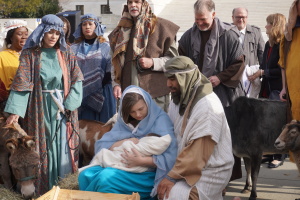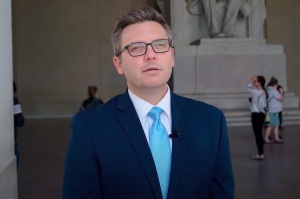Pakistan Gets Its First 'Megachurch' Amid Persecution
A newly built church in the city of Karachi that can seat as many as 5,000 worshipers tells the story of tolerance and flourishing of faith in Pakistan that often gets lost in the routine coverage of Islamist violence in this Muslim-majority country.
It took 11 months for the Catholic Archdiocese of Karachi, the capital of southern Sindh Province, to complete the construction of Pakistan’s largest church, St. Peter’s, in Akhtar Colony. But there was no sign of opposition.
For the 2,100-square-foot building’s inauguration on Nov. 9, “the entire commercial lane shut down [voluntarily] for security,” reported Pakistan’s Express Tribune newspaper. Archbishop of Karachi Evarist Pinto arrived on a horse-drawn carriage for the opening ceremony, and thousands of people greeted him by throwing rose petals.
Now, during weekly mass, or any other church function, area shops abstain from playing loud music to show their respect, the daily added. Residents in the neighborhood cooperated all through the 11 months of “noisy construction.”
For the church leadership, the new building is also a story of the people’s growing faith. “Due to our limited resources we had not imagined that we were embarking on a service as big as this,” Father Mario Rodrigues was quoted as saying. But as the construction began, international and national groups gave generously.
One-fourth of the total cost was met by the local Catholic community, Pastor Rodrigues said, adding that area Catholics gave sacrificially.
When the priests visited a local family to show gratitude, Rodrigues gave an example, they were moved to see the donors’ modest, two-room house. “We were so touched that we decided we could not accept it from them but they insisted, saying that they had been saving the money especially for the church over the course of several years,” the Rodrigues said.
The building includes a chapel with glass walls that will remain open around the clock for prayer and adoration, the first of its kind in the country.
Barely two months after the construction began, the country’s only Christian minister Shahbaz Bhatti, a Roman Catholic, was assassinated for opposing the notorious blasphemy law.
There are more than 1 million Catholics in Pakistan, while the total number of Christians is estimated to be over 3 million. Over 96 percent of the 170 million people in Pakistan are Muslim – more than 80 percent of them are Sunni, mostly Barelvis and Deobandis.
Reports of murder, rape, arson, abduction and forced conversion of Christians are routine in Pakistan, an Islamic republic, but most of the violent incidents can be linked to terrorist and Islamist extremist groups.
Christians persecution increased after the U.S. military’s Operation Enduring Freedom in neighboring Afghanistan in the wake of the 9/11 attacks, as Pakistan became an ally of the United States in the global war on terror.
In 2009, at least nine Christians were killed and over 45 houses were burned in a Christian hamlet in Korian village of Gojra town in central Punjab Province over a rumor that some pages of the Quran were burnt. The attackers, masked and carrying sophisticated guns, were supposedly from an Islamist militant outfit, the Sipah-e-Sahaba, linked to the Afghan Taliban. Its offshoot, the Lashkar-e-Jhangvi, is believed to be the al-Qaida’s front in Pakistan.
Human rights groups see Pakistan’s blasphemy law as the main instrument of persecution – not only of Christians, but also Shi’a Muslims, Ahmadis and Hindus.
The blasphemy law, Section 295 and 298 of the Pakistan Penal Code, carries death penalty. No one has ever been executed under it, but about ten accused have been murdered before the completion of their trial, according to BBC. Islamist extremists believe that killing a blasphemous person earns a heavenly reward.
An extreme Islamist killed a judge of the Lahore High Court, Justice Arif Iqbal Bhatti, in 1997 for acquitting three Christians in a blasphemy case two years earlier. In May 1998, a Catholic bishop, John Joseph, shot himself outside a courthouse to protest the blasphemy law.
CLAAS notes that allegations of blasphemy often “stem from the Muslim accuser’s desire to take revenge” and to “settle petty, personal disputes.” Islamist extremists often get involved in blasphemy cases.
Minister Bhatti was killed allegedly by the Islamist terrorist group Tehrik-i-Taliban Pakistan. A month before his assassination, Punjab Province Gov. Salman Taseer, a Muslim, was killed by his own bodyguard for calling the blasphemy law a black law.
Pakistan’s political crisis compounds the problem of extremism. The country’s Right-leaning military along with the intelligence agency ISI and the relatively progressive civil government led by President Asif Ali Zardari are seen as two separate entities in the country.
However, in the midst of the turmoil, faith has flourished. As the Karachi archbishop said about the St. Peter’s Church, it is “a sign of the growth of our faith.”




























